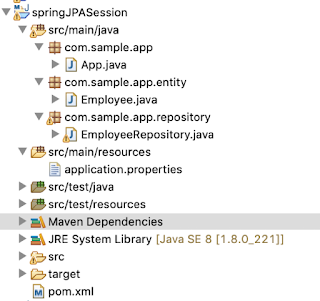‘entityManager.unwrap’ method is used to get hibernate session object.
Example
Session session = entityManager.unwrap(Session.class);
Find the below working application.
package com.sample.app.entity;
import javax.persistence.Entity;
import javax.persistence.GeneratedValue;
import javax.persistence.Id;
import javax.persistence.Table;
@Entity
@Table(name = "employees")
public class Employee {
@Id
@GeneratedValue
private int id;
private String firstName;;
private String lastName;
public Employee() {
}
public Employee(String firstName, String lastName) {
super();
this.firstName = firstName;
this.lastName = lastName;
}
public int getId() {
return id;
}
public void setId(int id) {
this.id = id;
}
public String getFirstName() {
return firstName;
}
public void setFirstName(String firstName) {
this.firstName = firstName;
}
public String getLastName() {
return lastName;
}
public void setLastName(String lastName) {
this.lastName = lastName;
}
@Override
public String toString() {
StringBuilder builder = new StringBuilder();
builder.append("Employee [id=");
builder.append(id);
builder.append(", firstName=");
builder.append(firstName);
builder.append(", lastName=");
builder.append(lastName);
builder.append("]");
return builder.toString();
}
}
EmployeeRepository.java
package com.sample.app.repository;
import java.util.List;
import javax.persistence.EntityManager;
import javax.persistence.PersistenceContext;
import javax.persistence.Query;
import org.hibernate.Session;
import org.springframework.stereotype.Repository;
import org.springframework.transaction.annotation.Transactional;
import com.sample.app.entity.Employee;
@Repository
@Transactional
public class EmployeeRepository {
@PersistenceContext
private EntityManager entityManager;
public Session getSession() {
Session session = entityManager.unwrap(Session.class);
return session;
}
public List<Employee> all() {
Session session = getSession();
Query query = session.createQuery("FROM Employee");
return query.getResultList();
}
public void save(Employee emp) {
getSession().save(emp);
}
}
pom.xml
<project xmlns="http://maven.apache.org/POM/4.0.0"
xmlns:xsi="http://www.w3.org/2001/XMLSchema-instance"
xsi:schemaLocation="http://maven.apache.org/POM/4.0.0 http://maven.apache.org/xsd/maven-4.0.0.xsd">
<modelVersion>4.0.0</modelVersion>
<groupId>com.sample.app</groupId>
<artifactId>springJPASession</artifactId>
<version>1</version>
<parent>
<groupId>org.springframework.boot</groupId>
<artifactId>spring-boot-starter-parent</artifactId>
<version>2.1.6.RELEASE</version>
</parent>
<properties>
<project.build.sourceEncoding>UTF-8</project.build.sourceEncoding>
</properties>
<dependencies>
<!-- https://mvnrepository.com/artifact/org.springframework.boot/spring-boot-starter-data-jpa -->
<dependency>
<groupId>org.springframework.boot</groupId>
<artifactId>spring-boot-starter-data-jpa</artifactId>
</dependency>
<!-- https://mvnrepository.com/artifact/com.h2database/h2 -->
<dependency>
<groupId>com.h2database</groupId>
<artifactId>h2</artifactId>
</dependency>
</dependencies>
</project>
Create application.properties file under src/main/resources folder.
application.properties
# Setting log level to DEBUG logging.level.org.springframework.web=ERROR ## H2 specific properties spring.h2.console.enabled=true spring.h2.console.path=/h2 spring.datasource.url=jdbc:h2:file:~/db/myOrg.db;DB_CLOSE_ON_EXIT=FALSE;DB_CLOSE_DELAY=-1; spring.datasource.username=krishna spring.datasource.password=password123 spring.datasource.driverClassName=org.h2.Driver ## JPA specific properties # Creates the schema, destroying previous data. spring.jpa.hibernate.ddl-auto=create spring.jpa.database-platform=org.hibernate.dialect.H2Dialect spring.jpa.show-sql=true spring.jpa.properties.hibernate.format_sql=true ## Database connection pooling properties # Number of ms to wait before throwing an exception if no connection is available. spring.datasource.max-wait=10000 # Maximum number of active connections that can be allocated from this pool at the same time. spring.datasource.tomcat.max-active=10 spring.datasource.tomcat.max-idle=5 spring.datasource.tomcat.min-idle=3
App.java
package com.sample.app;
import java.util.List;
import org.springframework.beans.factory.annotation.Autowired;
import org.springframework.boot.CommandLineRunner;
import org.springframework.boot.SpringApplication;
import org.springframework.boot.autoconfigure.SpringBootApplication;
import org.springframework.context.annotation.Bean;
import com.sample.app.entity.Employee;
import com.sample.app.repository.EmployeeRepository;
@SpringBootApplication
public class App {
@Autowired
private EmployeeRepository employeeRepo;
public static void main(String args[]) {
SpringApplication.run(App.class, args);
}
@Bean
public CommandLineRunner demo() {
return (args) -> {
Employee emp1 = new Employee("Ram", "Gurram");
Employee emp2 = new Employee("Sai", "Nidamanuri");
Employee emp3 = new Employee("Siva", "Ponnam");
Employee emp4 = new Employee("Lahari", "Gurram");
employeeRepo.save(emp1);
employeeRepo.save(emp2);
employeeRepo.save(emp3);
employeeRepo.save(emp4);
List<Employee> emps = employeeRepo.all();
System.out.println("-------------------------");
System.out.println("Printing Employees");
System.out.println("-------------------------");
for (Employee emp : emps) {
System.out.println(emp);
}
};
}
}
Total project structure looks like below.
Run App.java, you will see below messages in console.
------------------------- Printing Employees ------------------------- Employee [id=1, firstName=Ram, lastName=Gurram] Employee [id=2, firstName=Sai, lastName=Nidamanuri] Employee [id=3, firstName=Siva, lastName=Ponnam] Employee [id=4, firstName=Lahari, lastName=Gurram]
You can download complete working application from this link.

No comments:
Post a Comment